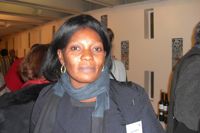DEVELOPMENT: Uniting Against Extreme Poverty

When Louisamène Joseph Alionat unexpectedly began singing in a packed hall at the United Nations cultural agency here this week, it was an attempt to give encouragement to her peers engaged in the uphill battle of trying to end extreme poverty.
'I work with families who live in abject conditions, and I know how hard it can get,' Joseph, a national of Haiti, told IPS. 'People are afraid to talk about their problems, and I’m always singing because it can help to make people feel better.'
Joseph, who said she was lucky to have survived the devastating 2010 earthquake in her country, was among several hundred delegates who took part in a three-day colloquium titled ‘Extreme Poverty Is Violence — Breaking the Silence — Searching for Peace’, financed by UNESCO and organised by ATD Fourth World.
The French-based group, which works to eradicate chronic poverty, carried out research over three years that examined the links between poverty, violence and peace. The resulting colloquium was a bid to 'analyse the violence of extreme poverty' and to 'foster dialogue and reciprocal learning among people of very different backgrounds,' the group said.
'We often judge people living in chronic poverty as those who commit violent acts, against which society must protect itself, forgetting that they are the first victims of ongoing daily violence,' ATD Fourth World stated.
Matt Davies, head of international policy and advocacy, said the organisation wanted to share its findings with academics, policy makers, and professionals working on human rights, social justice and sustainable development. By giving travel grants, the group ensured that 'grass-roots movements' led by people living in poverty could also play a key role in the talks.
'The starting point for us is that it is those who are living in poverty on a day-to-day basis who need to have a voice to tell social workers and politicians what it is that they’re fighting for and living, but also to be at a point where they can engage in a true dialogue with policy makers,' Davies told IPS.
More than 1,000 people from 25 countries participated in the ATD Fourth World research project, and some of them who travelled to Paris for the colloquium told IPS that they especially wanted to highlight the negative effects of poverty on children and teenagers.
'We have to break the silence and talk about the violence that children living in poverty endure,' said Moustapha Diop of Senegal. 'We are here because we are militants fighting in our countries against poverty. We’ve noted that in Africa, for instance, many of the authorities lived in poverty as children and as a result they didn’t get the right education to be able to lead the continent. It has to start with childhood.'
According to World Bank figures, some 1.3 billion people live in extreme poverty. It defines this as living on less than 1.25 dollars a day, but ATD Fourth World disagrees with this definition.
'We have our own analysis of poverty which is the lack of basic security that leads to exclusion, the erosion of rights and the inability to assume responsibilities on a day-to-day basis,' ATD’s communications officer Jo-Lind Roberts told IPS.
She said that one concern about statistics was that they did not generally include people living in European countries, Australia or the United States, where chronic poverty is also a problem.
ATD Fouth World takes issue as well with the wording of the United Nations Millennium Development Goals which seek to halve the proportion of people living below a dollar a day by 2015. The group says the goal should be 'people-based instead of target-based.'
Spanish diplomat and writer Federico Mayor Zaragoza, one of the keynote speakers at the colloquium, said that much more needs to be done at the U.N. level, so that 'eight or 20 countries' do not set the agenda.
'The same system that spends billions on arms and other military supplies allows thousands to die every day of hunger,' Mayor, a former director-general of UNESCO told IPS. 'This is unbelievable. It’s a shame. We must have the courage to say ‘no’ and to raise our voices so that things are rapidly changed.'
For Joseph of Haiti, where half a million people are still living in tents two years after the earthquake, the issue is to get the international community to listen and to act in solidarity to end extreme poverty.
'L’union fait la force (unity is strength),' she chanted several times at the colloquium, getting other delegates to repeat the words after her in an expression of hope.
© Inter Press Service (2012) — All Rights ReservedOriginal source: Inter Press Service
Where next?
Browse related news topics:
Read the latest news stories:
- Fallen Black South African Soldiers From World War I Finally Remembered Wednesday, January 22, 2025
- Let the Kite Fly High Wednesday, January 22, 2025
- Support for Haiti needed now ‘more than ever’, Security Council hears Wednesday, January 22, 2025
- Myanmar crisis: Civilians killed in airstrikes as Rohingya risk dangerous journeys Wednesday, January 22, 2025
- World News in Brief: Gaza aid surge, El Fasher update, aid to Somalia, justice in Belarus Wednesday, January 22, 2025
- In Syria, top UN envoy highlights international backing for political transition Wednesday, January 22, 2025
- Colombia: Catatumbo killings highlight fragility of peace process Wednesday, January 22, 2025
- Lebanon: Food insecurity deepens following conflict, new report reveals Wednesday, January 22, 2025
- Release of ship’s crew, ‘a step in the right direction’: UN Yemen envoy Wednesday, January 22, 2025
- At Davos, Guterres slams backsliding on climate commitments Wednesday, January 22, 2025
Learn more about the related issues: